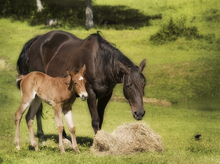Many horse owners begin thinking about breeding their mares in between February and early spring to produce a foal eleven months later. Experienced horse industry people are fully aware of the costs and complexities of horse breeding, but for back-yard horse breeders, often those costs and complexities go by the wayside and the idea of having a new foal is based on emotion without thinking through the responsibilities attached to the undertaking.

Thinking of breeding your mare? Don't be barn blind
Experienced horse industry people are aware of the costs and complexities of horse breeding, but back-yard breeders often breed their horses based on emotion and the costs and complexities come back to haunt them later.
Advice from horse industry people in the know should be welcomed by back-yard or occasional breeders. This advice usually includes the following important points:
- Breed your horse only when you know everything possible about the state of the health and the genetic make-up and/or pedigree of the parents-to-be.
- Know for a fact that you can take on the long-term costs and care of a new horse for the lifetime of the horse.
- Realize that no guarantee exists that a foal will look or act like the mare and stallion that produce it.
- Know that a mare may die during a difficult pregnancy or as a result of giving birth to the foal, or the mare's health may be seriously compromised. When the mare dies, not only do you lose the companionship of your horse, but your investment in time and money becomes irretrievable.
The American Horse Council estimates that approximately 9.2 million horses are living in the United States. Of these, approximately 170,000 are "unwanted," and suitable homes are not available for them. Most unwanted horses become so for one or more of the following reasons:
- Many horses are the result of irresponsible or over breeding,
- Owners breed horses believing that a ready market exists and they will make money on the sale of the horses,
- Owners lack financial ability to feed and take care of the horse,
- Older owners lack physical ability to care for a horse,
- Horses grow older, become ill, injured, or unmanageable,
- Horses fail to live up to owner's expectations either in performance or appearance,
- The horse was obtained originally as a "pet" without any consideration of the responsibilities of ownership,
- Not enough horse rescue places or funds exist to care for horses that lose their homes,
- The high cost of euthanasia causes many horses to be kept alive long after they begin suffering from any number of distressing terminal illnesses, and many older horses are abandoned when they no longer serve their owners' needs.
- Breeding any animal is a huge responsibility that needs to be carefully thought through and planned. Since horses are large animals that live for many years and have specific needs, careful consideration must be given to the responsibilities involved in breeding your mare or stallion.
The reality of breeding is that the best-laid plans can go awry and foals may fail to live up to the owners' expectations. Whether it is a conformation or temperament problem, or a lack of the desired color or physical appearance of the foal, it may become one of numerous unwanted horses for which homes are difficult to find.
Ill health, loss of income, a change in jobs or location, and many other factors can affect the horse owners' ability to keep and care for their horses. Before breeding another horse, consider all the "what if's" that could happen in your life and determine what will happen to the horse, if you should become disabled or can no longer afford a horse.
Don't let "barn blindness" in its many manifestations influence your decisions when it comes to breeding your horse.
